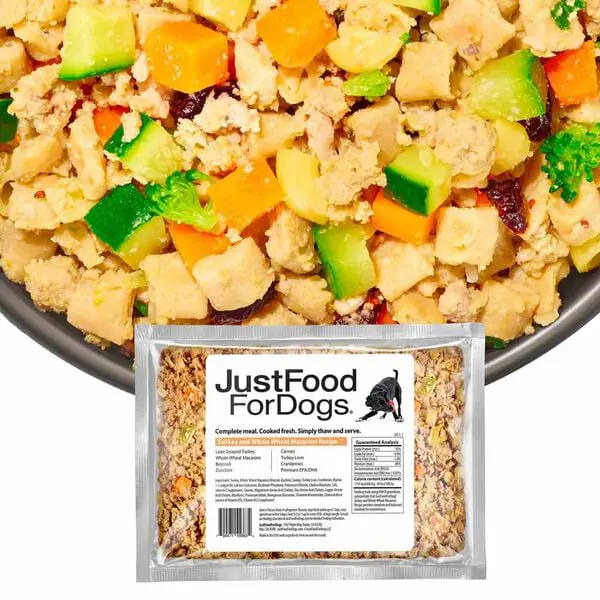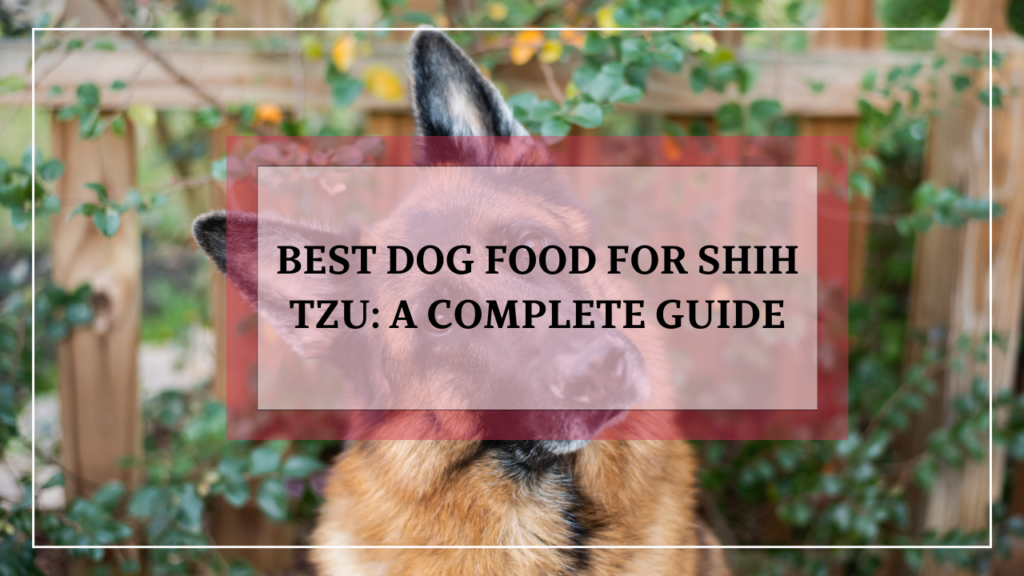Owning a Shih Tzu comes with the responsibility of ensuring they receive the best care, and a significant part of that care involves feeding them the right food. Shih Tzus are a unique breed with specific dietary requirements, and choosing the best dog food for your Shih Tzu can make a huge difference in their health and overall well-being. Whether you’re a new Shih Tzu owner or just looking to improve your dog’s diet, this comprehensive guide will cover everything you need to know.
In this article, we’ll explore the best dog food for Shih Tzus, highlighting various options tailored to their specific needs. We’ll dive into the nutritional requirements of Shih Tzus, common health issues that can be managed through diet, and much more. This guide is designed to provide valuable insights, whether you’re feeding a puppy, an adult, or a senior Shih Tzu.
Understanding Shih Tzu Dietary Needs
Nutritional Requirements of a Shih Tzu
Shih Tzus may be small in size, but they have a surprisingly robust set of nutritional requirements. Their diet must be balanced and provide all the essential nutrients they need to maintain their energy levels, support their immune system, and keep their coat shiny and healthy. Here’s a closer look at what makes Shih Tzu dietary needs unique:
1. Protein:
Proteins are the building blocks of your Shih Tzu’s muscles and tissues. A diet rich in high-quality animal proteins, such as chicken, lamb, or fish, is essential for maintaining their strength and supporting their active lifestyle. Look for dog foods that list real meat as the first ingredient.
2. Fat:
Healthy fats, particularly omega-3 and omega-6 fatty acids, are crucial for your Shih Tzu’s skin and coat health. These fats also provide a concentrated source of energy. However, since Shih Tzus are prone to obesity, it’s important to balance fat intake and monitor portion sizes.
3. Carbohydrates:
While carbohydrates are not essential in a dog’s diet, they can provide an additional source of energy. For Shih Tzus, easily digestible carbs like sweet potatoes or brown rice can be beneficial, especially if they are active.
4. Vitamins and Minerals:
Vitamins and minerals are vital for your Shih Tzu’s overall health. For instance, calcium and phosphorus are essential for strong bones and teeth, while vitamins like A and E support a healthy immune system and vision. Choose dog foods that are fortified with a complete range of vitamins and minerals.
Common Health Issues in Shih Tzus and How Diet Affects Them
Shih Tzus are prone to several health issues, many of which can be managed or alleviated through proper nutrition. Understanding these issues can help you make more informed choices when selecting the best dog food for your Shih Tzu:
1. Dental Problems:
Due to their small mouths and crowded teeth, Shih Tzus are susceptible to dental issues. Choosing dry kibble that encourages chewing can help reduce plaque buildup and keep their teeth clean.
2. Obesity:
Shih Tzus are known for their love of food, but this can easily lead to obesity if their diet isn’t carefully managed. Feeding them a balanced diet with appropriate portion sizes is crucial to avoid weight-related issues like joint problems or diabetes.
3. Allergies:
Shih Tzus can be prone to food allergies, which often manifest as skin irritations, itching, or digestive problems. Identifying and avoiding common allergens, such as grains or certain proteins, is important when selecting dog food.
4. Respiratory Issues:
Because of their short snouts (brachycephalic features), Shih Tzus can have breathing difficulties. While diet alone won’t prevent respiratory problems, maintaining a healthy weight through proper nutrition can alleviate pressure on their respiratory system.
Best Dog Food for Shih Tzus: A Comprehensive Guide
Shih Tzus are a toy breed with unique dietary requirements due to their small size, flat face (brachycephalic structure), and predisposition to certain health issues like allergies, sensitive digestion, and dental problems. Choosing the right food ensures proper growth, optimal digestion, a healthy coat, and strong immunity.
This guide highlights the best dog foods tailored for Shih Tzus, covering various types such as dry kibble, wet food, fresh diets, puppy food, allergy-friendly options, and more.
Best Dry Dog Food for Shih Tzus: Instinct Raw Boost Small Breed Real Chicken Recipe
Rating: ⭐⭐⭐⭐⭐
This high-protein, grain-free formula is a great choice for small breeds like Shih Tzus. Instinct Raw Boost combines nutrient-dense kibble with freeze-dried raw chicken to enhance flavor and nutrition.
Key Benefits:
- High protein content (38%) derived from fresh chicken and chicken meal
- Grain-free formula with no corn, wheat, or soy
- Includes chelated minerals for better nutrient absorption
- Contains natural omegas and probiotics for healthy skin, coat, and digestion
Main Ingredients: Chicken, chicken meal, chickpeas, tapioca, chicken fat
Best For: Adult Shih Tzus (not recommended for puppies)
Customer Insight: Many pet owners report that even their picky eaters enjoy this food, and it has helped improve their dogs’ coat quality and energy levels.
Best Wet Dog Food for Shih Tzus: Merrick Lil’ Plates Teeny Tiny Steak Tips Dinner
Rating: ⭐⭐⭐⭐⭐
Merrick Lil’ Plates is a grain-free wet food designed for small breeds, offering a high-protein formula with tender steak tips and a rich broth that enhances palatability.
Key Benefits:
- High protein (44%) from real beef
- Single-serving trays for portion control and convenience
- Contains glucosamine and chondroitin to support joint health
- Packed with probiotics and prebiotics to aid digestion
Main Ingredients: Beef, beef broth, venison broth, beef liver, dried egg whites
Best For: Adult Shih Tzus
Customer Insight: Owners love that their dogs eagerly finish every meal, with many noticing improvements in digestion and coat health.
Best Fresh Dog Food for Shih Tzu’s: Just Food For Dogs Turkey & Whole Wheat Macaroni

Rating: ⭐⭐⭐⭐⭐
JustFoodForDogs offers a veterinarian-formulated, human-grade fresh food designed to provide balanced nutrition for small breeds like Shih Tzus. Their Turkey & Whole Wheat Macaroni recipe is an excellent choice for owners looking for a wholesome, preservative-free meal.
Key Benefits:
✅ Veterinarian-developed formula tailored for optimal canine health
✅ High-quality animal protein (turkey) to support muscle maintenance
✅ Contains whole grains for sustained energy and digestive health
✅ Rich in essential nutrients like omega fatty acids, calcium, and taurine
Main Ingredients: Turkey, whole wheat macaroni, carrots, zucchini, cranberries, fish oil
Best For: Adult Shih Tzus and puppies
Best Puppy Food for Shih Tzus: Hill’s Science Diet Small Paws Puppy
Rating: ⭐⭐⭐⭐⭐
Hill’s Science Diet Small Paws Puppy is a veterinarian-recommended formula specifically designed for the unique nutritional needs of small and toy breed puppies like Shih Tzus. Made with high-quality ingredients, this kibble supports healthy growth, brain development, and digestion.
Key Benefits:
✅ High-quality protein (chicken meal) to promote lean muscle growth
✅ DHA from fish oil for brain and eye development
✅ Antioxidant-rich blend for a strong immune system
✅ Easily digestible ingredients to support gut health
Main Ingredients: Chicken meal, whole grain wheat, whole grain corn, whole grain sorghum, chicken fat
Best For: Shih Tzu puppies under 1 year old
Customer Insight: Many pet parents love how this food supports steady growth and healthy digestion, with small kibble pieces perfect for tiny mouths.
Best Budget-Friendly Dog Food for Shih Tzus: Blue Buffalo Small Breed Puppy Chicken & Oatmeal Recipe
Rating: ⭐⭐⭐⭐⭐
This high-quality, grain-inclusive formula offers an affordable yet nutritious option for Shih Tzus, particularly puppies transitioning to solid food.
Key Benefits:
- High protein (32%) from real chicken and fish meal
- Contains DHA for cognitive development
- Rich in antioxidants from fruits and vegetables
- Gentle on sensitive stomachs
Main Ingredients: Deboned chicken, chicken meal, oatmeal, barley, fish meal
Best For: Shih Tzu puppies
Customer Insight: Many owners find this food an excellent choice for transitioning puppies to a solid diet, noting positive digestion and growth results.
Best Dog Food for Shih Tzus with Allergies: Royal Canin Shih Tzu Adult Breed Specific Dry Dog Food
Rating: ⭐⭐⭐⭐⭐
If you’re seeking a high-quality, breed-specific diet for your Shih Tzu, Royal Canin Shih Tzu Adult Breed Specific Dry Dog Food is an excellent option.
Key Benefits:
- Skin and Coat Health: Formulated with an exclusive complex of nutrients, including EPA, DHA, and vitamin A, this food promotes healthy skin and a shiny coat, addressing common Shih Tzu concerns.
- Specialized Kibble Design: The kibble’s unique shape and size are tailored to the Shih Tzu’s brachycephalic jaw, making it easier for them to pick up and chew their food.
- Digestive Support: Contains high-quality proteins and precise fiber content to support healthy digestion and reduce stool odor.
Main Ingredients: Brewers rice, brown rice, chicken by-product meal, oat groats, chicken fat.
Best For: Adult Shih Tzus over 10 months old.
Best Grain-Inclusive Dog Food for Shih Tzus: Nutro Ultra Small Breed Adult
Rating: ⭐⭐⭐⭐⭐
Nutro Ultra offers a well-balanced diet with a blend of three animal proteins and antioxidant-rich ingredients to support small breeds like Shih Tzus.
Key Benefits:
- Moderate protein (29%) from chicken, lamb, and salmon
- Rich in antioxidants and omega fatty acids for immune and skin health
- Whole grains support digestive health
- No artificial flavors, colors, or preservatives
Main Ingredients: Chicken, chicken meal, whole grain sorghum, whole grain oats, whole grain brown rice
Best For: Adult Shih Tzus
Customer Insight: Many dog owners praise this food for maintaining their dog’s weight and coat health while providing a balanced and nutritious diet.
3 Homemade Dog Food Recipes for Shih Tzus
Benefits of Homemade Dog Food for Shih Tzus
Homemade dog food is becoming increasingly popular among Shih Tzu owners who want more control over their pets’ diets. Preparing meals at home allows you to customize your dog’s food based on their specific nutritional needs, preferences, and any dietary restrictions. Here are some of the key benefits of feeding your Shih Tzu homemade dog food:
- Customizable Diet: You can tailor the ingredients to suit your Shih Tzu’s specific needs, such as allergies or sensitivities to certain foods.
- High-Quality Ingredients: By choosing fresh, whole ingredients, you can ensure your dog is getting the best possible nutrition without fillers, additives, or preservatives.
- Transparency: You know exactly what’s going into your dog’s food, which gives you peace of mind about their health and well-being.
- Freshness: Homemade meals are often fresher than commercial dog food, which can enhance flavor and nutrient content.
- Bonding: Preparing your dog’s meals can strengthen the bond between you and your Shih Tzu, as you’re directly involved in their care and well-being.
While homemade dog food has many advantages, it’s crucial to ensure that the meals you prepare provide a balanced diet. Consulting with a veterinarian or a pet nutritionist is essential to make sure your Shih Tzu is getting all the nutrients they need.
Key Nutrients to Include in Homemade Dog Food for Shih Tzus
When creating homemade meals for your Shih Tzu, it’s important to include the right balance of nutrients to support their overall health. Here’s a breakdown of the key nutrients your dog needs:
- Protein: Protein is essential for muscle development and maintenance. Include high-quality protein sources like chicken, turkey, beef, fish, or eggs. For a small dog like a Shih Tzu, protein should make up about 25-30% of their diet.
- Carbohydrates: Carbohydrates provide energy and support digestive health. Opt for easily digestible carbs like brown rice, sweet potatoes, oats, or quinoa.
- Fats: Healthy fats are crucial for maintaining a shiny coat and healthy skin. Include sources of omega-3 and omega-6 fatty acids, such as fish oil, flaxseed oil, or small amounts of olive oil.
- Vitamins and Minerals: Ensure that your homemade meals include essential vitamins and minerals like calcium, phosphorus, zinc, and vitamins A, D, and E. These can be found in vegetables (like spinach, carrots, and broccoli), fruits (like blueberries and apples), and supplements if necessary.
- Fiber: Fiber is important for digestive health. Vegetables like pumpkin, green beans, and peas are excellent sources of fiber.
- Water: Ensure your Shih Tzu stays hydrated by providing plenty of fresh water and including moisture-rich foods in their diet.
Homemade Dog Food Recipes for Shih Tzus
Here are a few simple yet nutritious homemade dog food recipes tailored for Shih Tzus. These recipes provide a balanced mix of protein, carbs, fats, and essential nutrients.
1. Chicken and Rice Recipe
This basic recipe is easy to prepare and gentle on your Shih Tzu’s stomach.
- Ingredients:
- 1 pound of boneless, skinless chicken breasts
- 1 cup of brown rice
- 1/2 cup of carrots (chopped)
- 1/2 cup of peas (frozen or fresh)
- 1 tablespoon of fish oil (optional)
- Instructions:
- Boil the chicken breasts until fully cooked, then shred them into small pieces.
- Cook the brown rice according to package instructions.
- Steam or boil the carrots and peas until tender.
- Mix the shredded chicken, rice, and vegetables together in a large bowl.
- Add fish oil for an extra boost of omega-3 fatty acids.
- Allow the food to cool before serving. Store leftovers in the refrigerator for up to 3 days.
2. Turkey and Sweet Potato Recipe
This recipe provides a nutrient-dense meal that is both tasty and healthy for your Shih Tzu.
- Ingredients:
- 1 pound of ground turkey
- 1 cup of sweet potatoes (mashed)
- 1/2 cup of green beans (chopped)
- 1/2 cup of spinach (chopped)
- 1 tablespoon of olive oil
- Instructions:
- Cook the ground turkey in a skillet over medium heat until fully browned. Drain any excess fat.
- Boil or steam the sweet potatoes until soft, then mash them.
- Steam the green beans and spinach until tender.
- Mix the cooked turkey, sweet potatoes, green beans, and spinach in a large bowl.
- Drizzle with olive oil and mix well.
- Allow the food to cool before serving. Store leftovers in the refrigerator for up to 3 days.
3. Beef and Vegetable Stew Recipe
This hearty stew is packed with protein and essential nutrients to keep your Shih Tzu healthy and satisfied.
- Ingredients:
- 1 pound of lean ground beef
- 1 cup of brown rice
- 1/2 cup of carrots (chopped)
- 1/2 cup of broccoli (chopped)
- 1/4 cup of blueberries (optional)
- 1 tablespoon of flaxseed oil
- Instructions:
- Cook the ground beef in a skillet over medium heat until fully browned. Drain any excess fat.
- Cook the brown rice according to package instructions.
- Steam the carrots and broccoli until tender.
- In a large pot, combine the cooked beef, rice, carrots, broccoli, and blueberries.
- Add flaxseed oil and mix well.
- Allow the stew to cool before serving. Store leftovers in the refrigerator for up to 3 days.
Tips for Preparing Homemade Dog Food for Shih Tzus
When preparing homemade dog food for your Shih Tzu, here are some additional tips to keep in mind:
- Consult a Veterinarian: Always consult your vet before making any major changes to your dog’s diet. They can help you ensure that the homemade meals are nutritionally balanced.
- Portion Control: Be mindful of portion sizes to avoid overfeeding. Shih Tzus are small dogs and can easily gain weight if overfed.
- Monitor Health: Keep an eye on your Shih Tzu’s weight, energy levels, and overall health. If you notice any changes, adjust the diet as needed or consult your vet.
- Avoid Toxic Foods: Certain human foods like chocolate, grapes, onions, and garlic are toxic to dogs. Make sure to keep these out of your Shih Tzu’s meals.
Pros and Cons of Homemade Dog Food for Shih Tzus
While homemade dog food can be a great option, it’s important to weigh the pros and cons before committing to this approach:
Pros:
- Customization: You have full control over the ingredients and can cater to your dog’s specific needs.
- Freshness: Homemade food is often fresher than commercial options.
- Quality Control: You can ensure that your dog is getting high-quality, nutrient-rich ingredients.
Cons:
- Time-Consuming: Preparing homemade meals requires time and effort, which may not be practical for everyone.
- Nutritional Balance: It can be challenging to ensure that homemade meals provide all the essential nutrients your dog needs.
- Cost: Depending on the ingredients, homemade dog food can be more expensive than commercial options.
FAQs About the Best Dog Food for Shih Tzus
1. What is the best dog food for Shih Tzus?
The best dog food for Shih Tzus is one that meets their specific nutritional needs, supports their small size, and addresses any unique health concerns. High-quality commercial dog foods designed for small breeds, or customized homemade diets, can both be excellent choices. Look for foods with high-quality protein sources, balanced fats, and essential vitamins and minerals. Brands like Royal Canin, Hill’s Science Diet, and Wellness Core offer specialized options for Shih Tzus.
2. How often should I feed my Shih Tzu?
Shih Tzus typically require two to three meals per day. Puppies might need more frequent feeding, around three to four times a day, while adult Shih Tzus do well with two meals. Adjust portions based on their age, weight, activity level, and overall health. Ensure you follow feeding guidelines provided by your dog food brand or your veterinarian.
3. Can Shih Tzus eat human food?
While some human foods are safe for Shih Tzus, many are not. Foods like lean meats, carrots, apples, and cooked sweet potatoes can be healthy treats in moderation. However, avoid giving them chocolate, grapes, onions, garlic, and fatty foods, as these can be toxic to dogs. Always consult your veterinarian before introducing new human foods into your dog’s diet.
4. How do I know if the dog food I’m choosing is good for my Shih Tzu?
To determine if the dog food is suitable for your Shih Tzu, check for the following:
- Quality Ingredients: Look for high-quality proteins (like chicken or beef) and whole grains.
- Nutritional Balance: Ensure the food meets AAFCO (Association of American Feed Control Officials) standards for complete and balanced nutrition.
- Specific Formulation: Choose food formulated for small breeds or specifically for Shih Tzus.
- Avoid Fillers: Steer clear of foods with excessive fillers like corn and soy, artificial colors, and preservatives.
5. What are some common health issues in Shih Tzus related to diet?
Shih Tzus are prone to several health issues that can be influenced by their diet, including:
- Obesity: Due to their small size and tendency to overeat, obesity is a common issue. Monitor portion sizes and avoid overfeeding.
- Dental Problems: Shih Tzus are prone to dental issues, so consider foods that promote dental health or provide dental chews.
- Allergies: Some Shih Tzus may have food allergies or sensitivities. Look for hypoallergenic formulas or consider homemade diets if allergies are suspected.
- Digestive Issues: Gastrointestinal problems can arise from poor-quality food. Choose easily digestible ingredients and consult your vet if digestive issues persist.
6. Is grain-free food better for Shih Tzus?
Grain-free food can be beneficial for dogs with grain allergies or sensitivities, but it’s not necessarily better for all Shih Tzus. Many dogs thrive on diets that include grains like brown rice or barley. If you suspect a grain allergy, consult your veterinarian for a proper diagnosis and recommendations.
7. How can I transition my Shih Tzu to a new dog food?
Transitioning to a new dog food should be done gradually to avoid digestive upset. Follow these steps:
- Mix Old and New Food: Start by mixing a small amount of the new food with the old food.
- Gradual Increase: Gradually increase the proportion of the new food while decreasing the old food over a period of 7-10 days.
- Monitor: Watch for any signs of digestive issues, such as vomiting or diarrhea, and consult your vet if any problems occur.
8. How much should I feed my Shih Tzu?
The amount to feed your Shih Tzu depends on their age, weight, activity level, and the specific food you’re using. Follow the feeding guidelines provided on the dog food package or consult your veterinarian for personalized recommendations. Generally, Shih Tzus need around 400-600 calories per day, divided into two to three meals.
9. Are there any special dietary needs for older Shih Tzus?
Older Shih Tzus may have different dietary needs compared to younger dogs. They may benefit from food that supports joint health, has lower calories to manage weight, and includes easily digestible ingredients. Look for senior dog food formulas or consult your vet for advice on the best diet for your aging Shih Tzu.
10. Can I give supplements to my Shih Tzu?
Supplements can be beneficial for certain health issues or to complement your Shih Tzu’s diet. Common supplements include omega-3 fatty acids for skin and coat health, glucosamine for joint support, and probiotics for digestive health. Always consult your veterinarian before starting any supplements to ensure they are appropriate for your dog.

Hi, I’m Ali Tarek, the founder of Animalsman. I’ve always been passionate about pets, especially dogs and cats, and I created this website to share practical tips, easy recipes, and helpful care advice for fellow pet lovers. My goal is to make pet care simple, enjoyable, and accessible for everyone. When I’m not writing or curating content, you’ll usually find me spending time with my furry friends or learning new ways to keep them happy and healthy.









